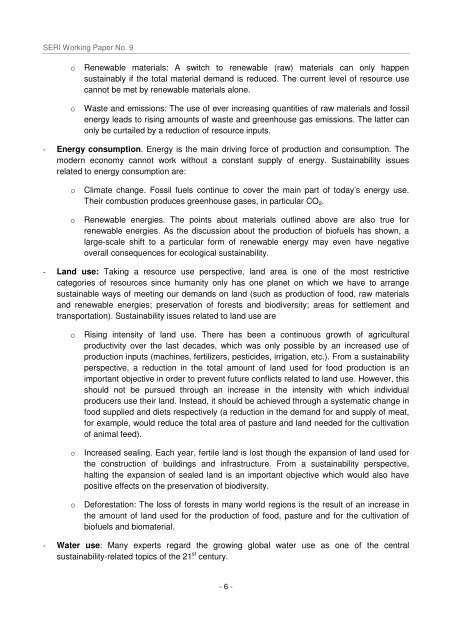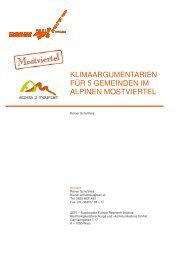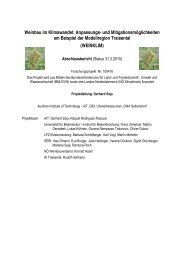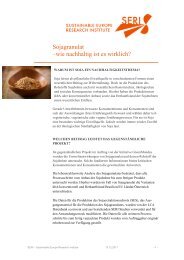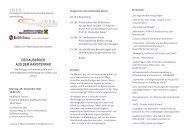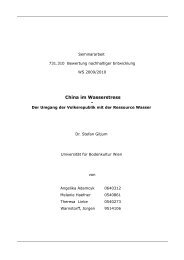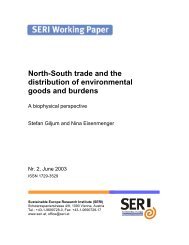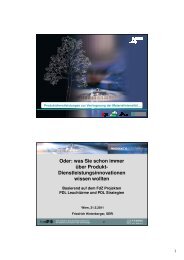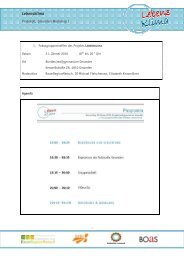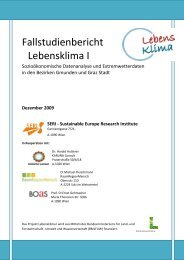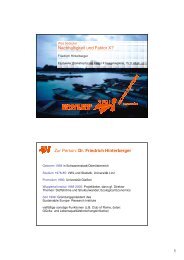Download PDF - Sustainable Europe Research Institute
Download PDF - Sustainable Europe Research Institute
Download PDF - Sustainable Europe Research Institute
Create successful ePaper yourself
Turn your PDF publications into a flip-book with our unique Google optimized e-Paper software.
SERI Working Paper No. 9<br />
o Renewable materials: A switch to renewable (raw) materials can only happen<br />
sustainably if the total material demand is reduced. The current level of resource use<br />
cannot be met by renewable materials alone.<br />
o Waste and emissions: The use of ever increasing quantities of raw materials and fossil<br />
energy leads to rising amounts of waste and greenhouse gas emissions. The latter can<br />
only be curtailed by a reduction of resource inputs.<br />
- Energy consumption. Energy is the main driving force of production and consumption. The<br />
modern economy cannot work without a constant supply of energy. Sustainability issues<br />
related to energy consumption are:<br />
o Climate change. Fossil fuels continue to cover the main part of today’s energy use.<br />
Their combustion produces greenhouse gases, in particular CO2.<br />
o Renewable energies. The points about materials outlined above are also true for<br />
renewable energies. As the discussion about the production of biofuels has shown, a<br />
large-scale shift to a particular form of renewable energy may even have negative<br />
overall consequences for ecological sustainability.<br />
- Land use: Taking a resource use perspective, land area is one of the most restrictive<br />
categories of resources since humanity only has one planet on which we have to arrange<br />
sustainable ways of meeting our demands on land (such as production of food, raw materials<br />
and renewable energies; preservation of forests and biodiversity; areas for settlement and<br />
transportation). Sustainability issues related to land use are<br />
o Rising intensity of land use. There has been a continuous growth of agricultural<br />
productivity over the last decades, which was only possible by an increased use of<br />
production inputs (machines, fertilizers, pesticides, irrigation, etc.). From a sustainability<br />
perspective, a reduction in the total amount of land used for food production is an<br />
important objective in order to prevent future conflicts related to land use. However, this<br />
should not be pursued through an increase in the intensity with which individual<br />
producers use their land. Instead, it should be achieved through a systematic change in<br />
food supplied and diets respectively (a reduction in the demand for and supply of meat,<br />
for example, would reduce the total area of pasture and land needed for the cultivation<br />
of animal feed).<br />
o Increased sealing. Each year, fertile land is lost though the expansion of land used for<br />
the construction of buildings and infrastructure. From a sustainability perspective,<br />
halting the expansion of sealed land is an important objective which would also have<br />
positive effects on the preservation of biodiversity.<br />
o Deforestation: The loss of forests in many world regions is the result of an increase in<br />
the amount of land used for the production of food, pasture and for the cultivation of<br />
biofuels and biomaterial.<br />
- Water use: Many experts regard the growing global water use as one of the central<br />
sustainability-related topics of the 21 st century.<br />
- 6 -


